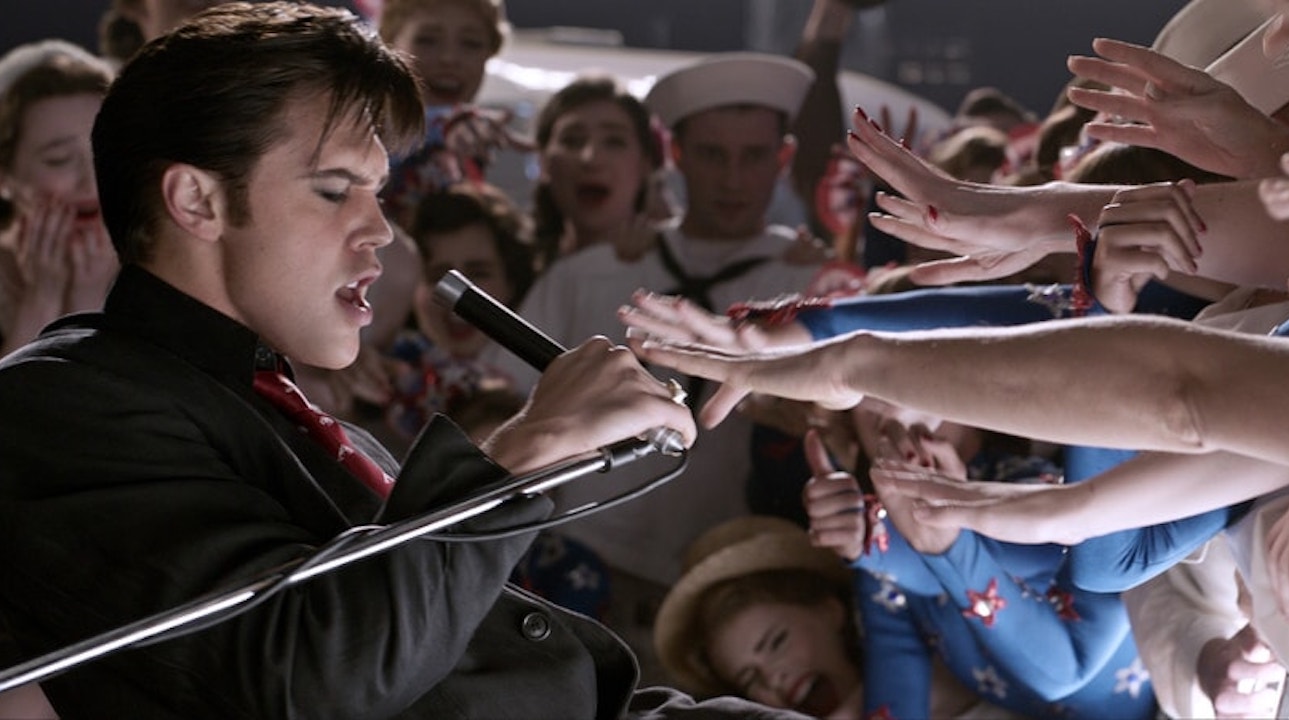In 1956, my dad was in a merchant navy ship off the coast of New York. As the lights of the city grew closer, he switched on his radio, fiddled with the dial and tried to pick up a New York radio station.
What he hit upon was unlike anything he’d ever heard before: His ship had left Scotland swinging to the sounds of Pat Boone and Alma Coogan; the song coming out the radio was Hound Dog by Elvis Presley. It may as well have been beamed-in from Pluto. (“What,” thought the men on board, “is New York gonna be like if this is what they’re listening to?”)
I reminded my dad of this recently and his thoughts immediately turned to Elvis’s death and his last gig in June 1977, filmed for a TV special.
“I was almost greetin’ [crying] watching it,” he said. “Elvis brought his dad onstage at the end. I could’ve choked him. That boy should’ve been in a hospital, not onstage. He should’ve looked out for him, the old bastard.”
Baz Luhrmann’s Elvis races through Elvis’s glorious world-shaking rise to his gun-toting, pill-popping demise. Ecstatic, chaotic, intoxicating, Elvis is a reminder of the impact Presley had on that generation and the generations to come. (Lester Bangs: “Elvis kicked How Much Is That Doggie in the Window? out the window and replaced it with ‘Let’s fuck’.”)
And by the time it reaches its climax, it’s a reminder of how even Elvis just needed someone to look out for him. It might make you want to greet too.
Elvis seems like a strange choice for a biopic in 2022. A straight white man dogged by allegations of racism. A rock star who met and dated a 14 year old, who later put it right by marrying and having a kid with her… only to cheat on her constantly. A man who went from Public Enemy to establishment figure. A paranoid, pill-guzzling square with the ear of Nixon. A bloated showbiz hack fleecing the Schmos in Vegas. A ridiculous cliche in rhinestone-studded jumpsuits.
Really? That’s our hero?
Luhrmann reminds you of the other Elvis. Austin Butler (last seen as Tex Watson in Once Upon A Time In Hollywood) is incredible as the fearless young man – a make-up wearing misfit, an outsider sneered at by his straight male peers – who blended ‘black’ and ‘white’ music and ushered in the rock’n’roll era, who scandalised and then swept away the old guard with hip-shaking, leg-pumping sexuality.
Luhrmann’s soundtrack takes Presley’s music and mashes it up with new sounds from Diplo, Doja Cat, Yola, Jack White, Tame Impala and Maneskin. The revolution that that Elvis started, he says, continues still.
There are parallels with cancel culture: the squares who tried to ban him, the media who tried to censor, shame and de-platform him. Today, these terms are weaponised by the conservative right but Elvis reminds you of who’s really in control – the money-men, the corporations – and the many decades that the conservative right stage-managed the media, practising racial segregation, keeping working class voices off the TV.
Before Elvis – and long afterwards, to be fair – popular entertainment had a middle class veneer that was at odds with how real lives were lived. It was as performative and fake as Instagram is now. The movie compares the stupefying schmaltz of a show by old country star Hank Snow against ecstatic performances by Little Richard, Arthur “Big Boy” Crudup, Sister Rosetta Tharpe and more.
The pace and style is so dizzying and seductive that there’s no time for the usual cliches of the rock biopic.
The music of black America, it says, is the true music of its soul. It’s the music that young Presley is drawn to and channels. His success in doing so (Gasp! “A white man playing black music!”) is recognised as a marketing opportunity by old school carny huckster Colonel Tom Parker (played with sweaty menace by Tom Hanks) who, failing to see the irony, then proceeds to try and turn him into Hank Snow, defanged and neutered.
At times Luhrmann’s Elvis seems too good to be true. Did he really, at the first peak of his fame, venture down to the black clubs of Beale Street to hang out with BB King and watch Little Richard? (Yes, he did, though it was Ray Charles, not Richard – they had to change it because bumping into Ray Charles would open some kind of rock biopic multiverse. And no-one needs that.)
Did he really break Memphis’s segregation laws by refusing to give a shit and going to the fair on ‘colored night’? Yes, ma’am.
Did he really fight Colonel Parker to turn a planned Christmas TV special into what we know now as the ’68 Comeback Special? Yup.
Was If I Can Dream, that show’s Big Statement – a plea for peace and racial harmony – written on the spot as a response to the shootings of Martin Luther King and Robert Kennedy? Again, yes. (Luhrmann’s cinematic sleight of hand suggests Elvis wrote it – in fact, arranger Earl Brown was asked to come up with “something” to end the show and knocked up the song overnight.)
The movie doesn’t have time to stop and explain. The Guardian’s Peter Bradshaw complained that it was like "a 159 minute trailer… a relentless, frantically flashy montage” and in a sense he’s right: it’s all killer, no filler. The plus side? The pace and style is so dizzying and seductive that there’s no time for the usual cliches of the rock biopic.
He wants to be a great daddy to Lisa-Marie, and a dream husband to Priscilla but – heck, darlin’ – there’s a lot of vaginas out there that need filling. It’s just a burden he has to bear.
Luhrmann knows-that-you-know the Elvis story, so he uses every trick in the filming-making book – split screens, animations, zooms, tracking shots, filmic grain, vivid colour, flashback, fantasy – in a movie so stylised that it could be a David LaChapelle shoot or a Jean Paul Gaultier ad, full of buff sailors and hot babes, and powered by a backbeat straight outta Sun Studios and remixed by Dr Dre and Diplo.
Such is the success of Elvis that by the end, Presley is no longer a privileged rich white guy. Instead, he occupies that most powerful of 21st century positions: he’s a victim.
Bullied, shafted, exploited, drugged, out-manoeuvred – let down by his father, fleeced by his manager – the brief glimpse of backbone he shows during the making of the Comeback Special comes to nothing.
He wants to leave Vegas and tour the world, but he doesn’t. He wants to leave Parker but he doesn’t. He wants to be a great daddy to Lisa-Marie, and a dream husband to Priscilla but – heck, darlin’ – there’s a lot of vaginas out there that need filling. It’s just a burden he has to bear. America needs him!
If the film falls down anywhere it’s here. Priscilla’s age is never mentioned (implied: "Hey! It was the 60s!") and Saint Elvis shoulders none of the blame. It was like he never quite understood his appeal, never thought himself worthy, like he was so bamboozled and grateful for his success, that Colonel Tom could convince him that any old shite would do. Colonel Tom, the alchemist, turning cornballs into cash.
Having helped define an entire generation, he buckled and entrusted his future to the Colonel and Vernon Presley, his father. The old bastards got him in the end.
Elvis is in UK and US cinemas from 24 June.

